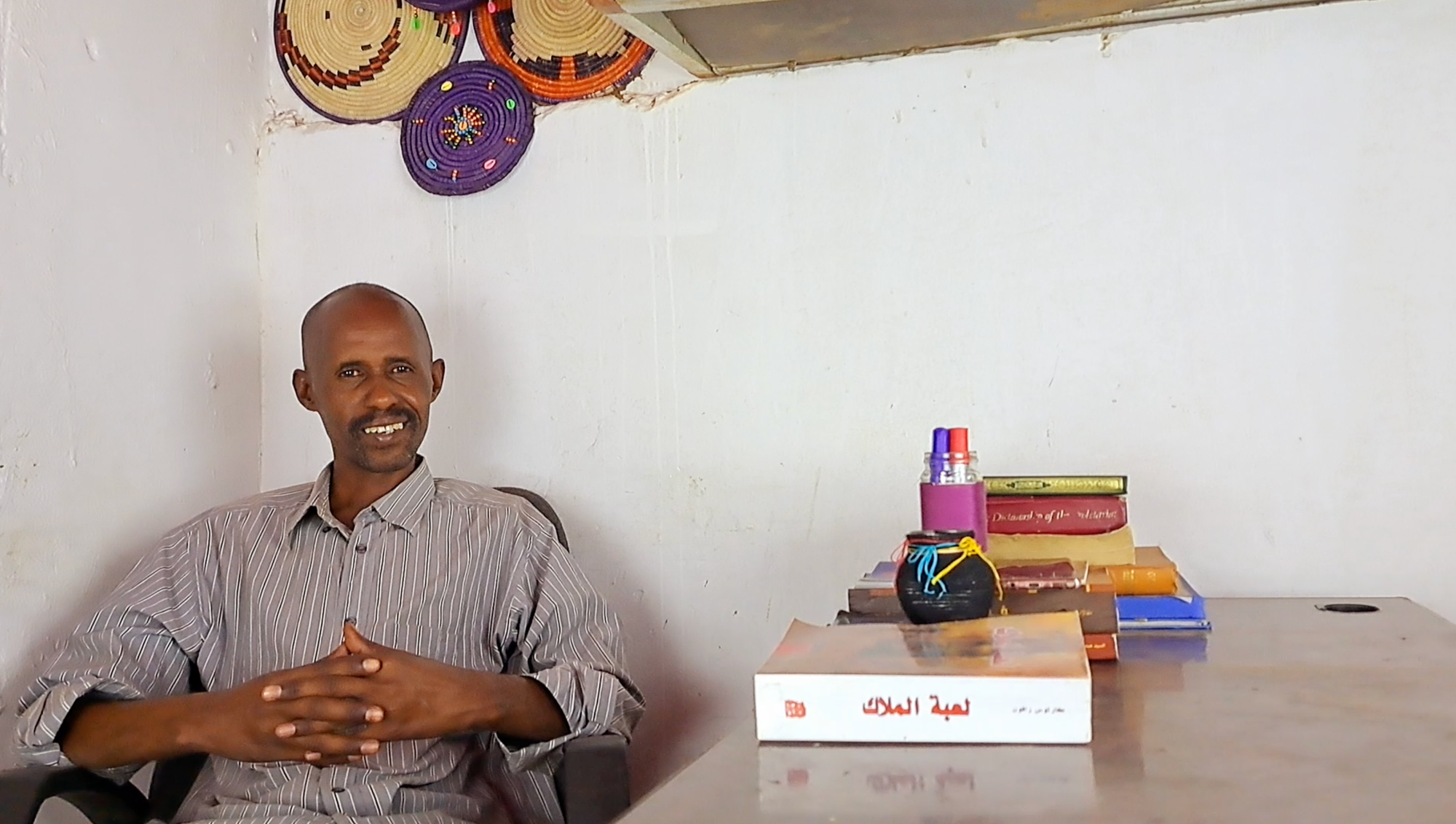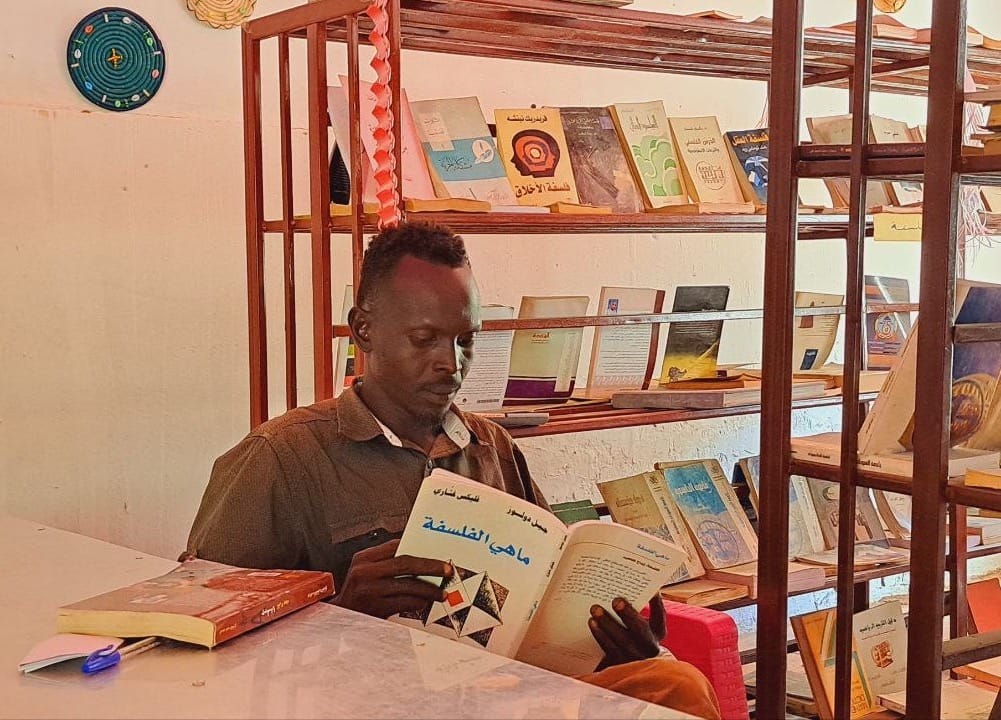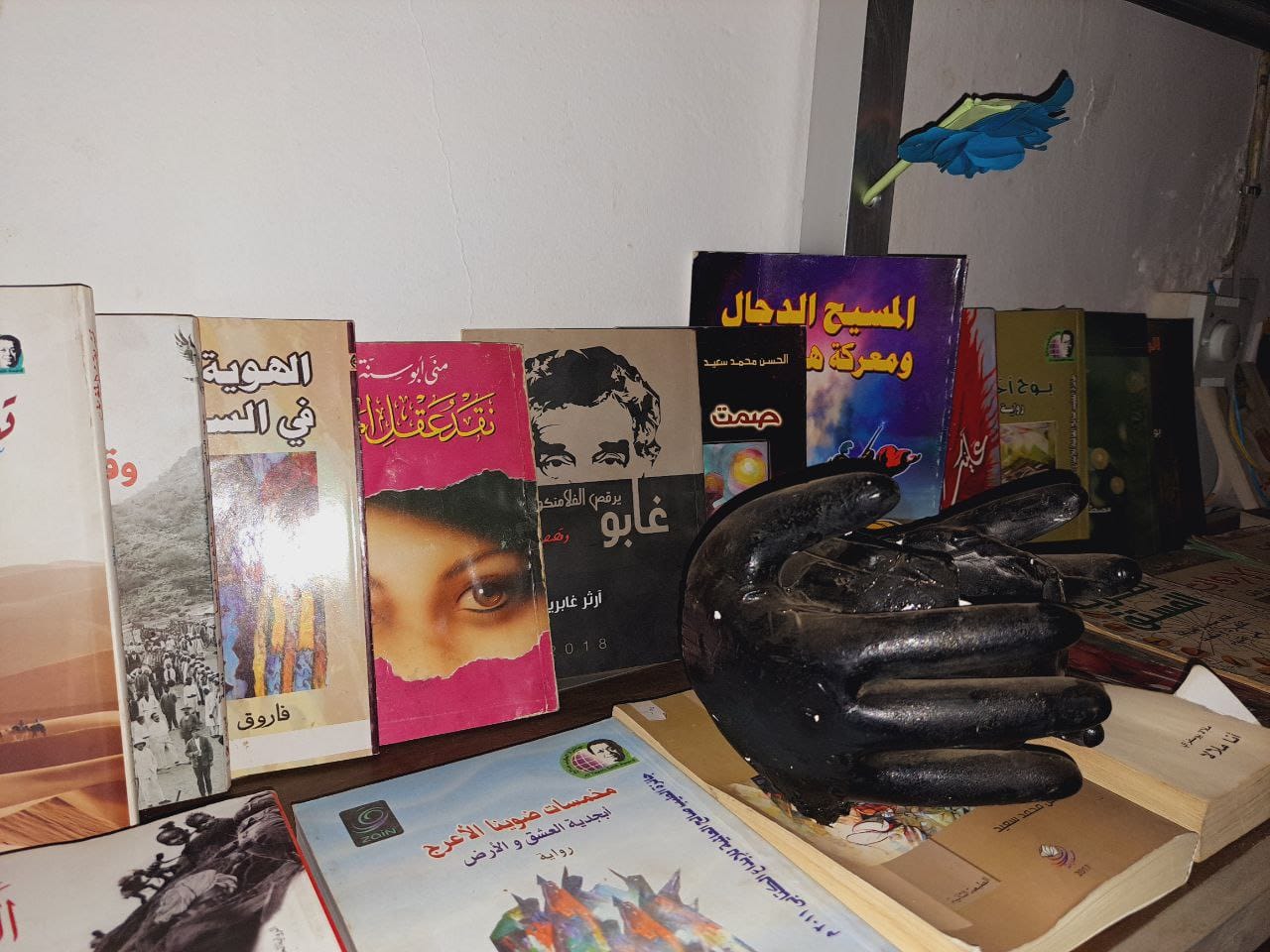Books, a Refuge in War
On December 23rd, the Qanadeel Cultural Forum inaugurated the El-Daein Library, housed in the El-Daein Cultural Club. The library opened with more than 1,100 books gifted to the program by Stella Gaetano, an author born in Khartoum who is now a citizen of South Sudan.

reporting by Amal Ahmed Beito
written by Brian Conley, with assistance from the Alive-in/ editorial team
This story is part of a partnership between Alive-in/ and DT-Institute to support Sudanese journalists inside and outside Sudan. DT Institute is both a funder and an implementer of peace and development projects. More stories can be read in Arabic on the Alive-in/Sudan Facebook page.
Alive-in is a not-for-profit media agency that mentors journalists from underrepresented communities to increase local and national understanding.
If you are able to support our work financially, please click the button below.
Waseela Hassan Mohammed Othman sits at a table in the sparsely decorated El-Daein library, the founders of the young library have focused primarily on form over function. Aside from a few handicrafts hanging on the walls or sitting on shelves, the room is empty save for the books.
According to Waseela, the effort to open this library began in 2020, but it took more than three years to find a suitable location. “Those in charge of the country weren't engaging with us. They didn’t open any doors for us in many places we could have used but didn’t give us the opportunity.”
Waseela described how they approached several different organizations, including the local Youth Center and the Lawyer’s Association but neither organization offered to support them. The project had many false starts and faced a number of obstacles due to the social and political situation in Sudan. Eventually they found an available space at the El-Daein Cultural Club and negotiated to house the library there.
The library was quiet, which Waseela told Alive in Sudan was common, and on a typical day not more than ten or twenty people visit. Despite the difficult situation in El-Daein and the small numbers of the audience, Waseela remains hopeful about the library’s future.“I think these are good beginnings for a new library under such exceptional circumstances. However, I firmly believe it will have many patrons since I know this country has many avid readers.”
Despite the ongoing conflict and large numbers of displaced Sudanese, the Cultural Club continues to hold a lot of activities, including musical events and celebrations, leaving just three days a week that the library runs without noise and other interruptions. Furthermore, the space available for the library is cramped, and not nearly what they hoped for.
Even so, Waseela remained optimistic and told Alive in Sudan, “We aim to prepare the back area of the library to make it more spacious for readers and to host activities like book discussions, workshops, or any other library-related events.”
Yasser Abu Qareen Al-Hala, a visitor to the library, spoke about how the library came to El-Daein, and his role as a member of a group of young people who expressed interest in adding some kind of book exhibition to the Cultural Club’s offerings. Like Waseela, the library gives him hope.

“From the El-Daein Library, I gained a lot: knowledge and new friends who became like brothers to me. I read many books, and I hope the youth, especially from El-Daein, become regulars at the library, as self-directed learning is very important now with formal education halted.”
Commenting on his own spark of optimism, Waseela said, “In these challenging circumstances, seeing young people capable of establishing a library gives me hope and optimism. These young people are strong and have the ability to make a difference, and I wish them success.”
The books were first gifted to the Qanadeel Cultural Forum in 2020, when Stella Gaitano visited Darfur as part of her “Make a Difference with a Book” initiative. Waseela told Alive in Sudan, “This forum was her gateway here in East Darfur. She visited us in 2020, then went to Nyala and Nertiti, and from there she returned to Khartoum and launched this initiative.
Born in Khartoum, Stella Gaitano is the daughter of parents of South Sudanese descent. Stella lost her citizenship after South Sudan declared independence and relocated to Juba. As an activist she continued to be involved in humanitarian and educational work in both countries, before moving back to Khartoum in 2015 due to pressure from the South Sudanese government, before eventually resettling in Germany in 2022.
The library hosts a variety of books, including novels, political books, intellectual books, books on philosophy, economics, and religious books.
Yasser said that he used to mostly read novels, “But eventually, I started reading philosophy. I now tend to look for real, genuine things and am less inclined toward fictional stories. I love searching for the truth.”
Storytelling is a fundamental part of Sudanese societies that for centuries predominantly existed in the form of oral histories or ‘Ahaji’, transmitted from one generation to the other. This form of storytelling is still prominent and central to peace building in Sudan today. The “Hakamat” of South Darfur and Kordofan verbally influence societies, according to Akbar Saad, a researcher in Darfuri Heritage. The name itself is derived from governance and wisdom, and the Hakamat fulfill this role by reciting poetry to resolve conflict, give praise, and inspire community and cooperation during times of migration, instability or even celebrations.

Today these oral traditions continue, but are bolstered by a growing list of well-known modern Sudanese authors. Stella Gaitano’s literary prowess adds to the rich Sudanese literary landscape. Altayeb Salih gained international recognition for his best-selling novel ‘Season of Migration to the North’, the book explores recurring themes in Sudanese literature such as identity, post-/colonialism and cultural displacement through the story of his unnamed protagonist, a Sudanese man who returns home after studying in England, and forced to face his alienation from his native culture. Another well known contributor is Leila Aboulela, who is known for focusing on the experiences of migration and cultural transformation and highlights religious and social tensions faced by her main characters who are muslim women.
The library’s eventual influence on El-Daein remains undetermined, although Yasser believes there has already been a big impact, “The community itself doesn’t fully understand the role of reading or education. If the youth frequent the library, they will understand its true impact because they will experience learning.”
Waseela told Alive in Sudan that the library’s impact will continue to grow, especially if they can increase their support from the local community, “We aim to make the library large and comprehensive enough to accommodate all readers in El-Daein and all cultural organizations. I hope that everyone interested in the library will support it next year, visit, and see what it lacks and needs.”
Yasser expressed his gratitude to the Forum for the establishment of the library, “Despite the club's limited resources, it was a sanctuary during the war. I hope the war ends soon. Leaving my house and coming to the library to read became a way to breathe and add something meaningful to my life.”
